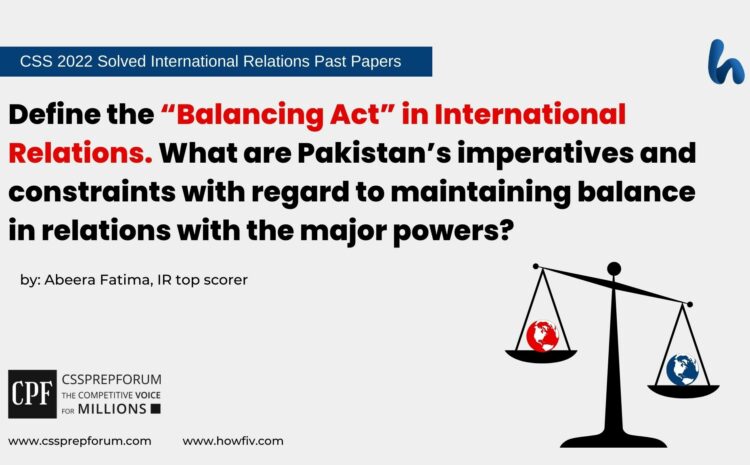Q6. Define the “Balancing Act” in International Relations. What are Pakistan’s imperatives and constraints with regard to maintaining balance in relations with the major powers?

In international relations, the “balancing act” refers to a strategy pursued by states to maintain equilibrium and manage their relationships with major powers or regional actors. It involves carefully navigating between competing powers or interests, often with the aim of safeguarding national security, maximizing benefits, and minimizing risks. Balancing can take different forms, such as balancing against a dominant power, balancing through alignment with multiple powers, or balancing through hedging and maintaining flexibility.
In the context of Pakistan, the country faces several imperatives and constraints in maintaining balance in its relations with major powers. Here are three key considerations:
1. Security Imperatives: Pakistan’s geopolitical location, ongoing conflicts in the region, and its historical rivalry with India influence its security imperatives. Balancing its relationship with major powers is crucial for acquiring security assistance, military capabilities, and diplomatic support. Pakistan seeks to secure its borders, maintain a credible deterrence posture, and address internal security challenges.
2. Economic and Developmental Constraints: Pakistan’s economic constraints pose a significant challenge in maintaining balance. The country requires foreign investment, financial assistance, and access to markets to support its economic development. Balancing relations with major powers allows Pakistan to tap into economic opportunities, receive aid packages, and secure trade partnerships to address its developmental needs.
3. Regional Dynamics and Internal Politics: Pakistan’s relations with major powers are influenced by regional dynamics and its own internal politics. Its relationships with neighboring countries, such as India, Afghanistan, and Iran, impact its alignment choices. Domestic political considerations, including public sentiment, domestic priorities, and ideological factors, also shape Pakistan’s balancing strategy.
Constraints on Pakistan’s balancing act include:
a) Dependency on External Assistance: Pakistan’s reliance on external assistance, particularly from major powers, can limit its flexibility in foreign policy decision-making. Assistance and support often come with conditions and expectations that may restrict Pakistan’s maneuverability and limit its policy choices.
b) Security Dilemma and Arms Race: Pakistan’s balancing act can be influenced by the security dilemma it faces, particularly with India. The competition and arms race between the two countries can constrain Pakistan’s options and push it towards closer alignment with certain major powers for security guarantees and military support.
c) Regional Rivalries and Conflicts: Pakistan’s balancing act is also constrained by regional rivalries and conflicts, such as the India-Pakistan dispute over Kashmir and the complex dynamics in Afghanistan. These conflicts can limit Pakistan’s room for maneuver and force it to align more closely with certain major powers for support or to counter regional rivals.
In summary, Pakistan’s imperatives and constraints in maintaining balance in relations with major powers stem from its security concerns, economic and developmental needs, regional dynamics, and internal politics. Balancing allows Pakistan to secure its security interests, address economic constraints, and navigate complex regional dynamics. However, the country’s balancing act is also shaped by external dependencies, the security dilemma, regional rivalries, and conflicts.